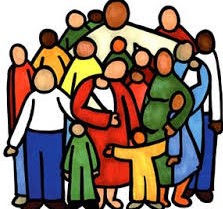How We View “Church”
 |
| Google Image |
An itinerant preacher is in a small house, packed with people who are transfixed listening to his experience of God as loving Father. It contradicts much of what the listeners have learned and, as usual with this preacher, many are confused.
Suddenly, he is interrupted by someone who says, “Rabbi, your mother and brothers are outside, wanting to speak with you.” In a seemingly rude way, he answers, “Who is my mother and who are my brothers?”
Then he answers his own question, indicating his listeners: “Here are my mother and my brothers! For whoever does the will of my Father in heaven is my brother, and sister, and mother.”
Many of you will recognize this story about Jesus in Matthew’s gospel, and also be confused. Surely, Jesus wasn’t rejecting his family. Surely, he loved them.
Writing from Memory
One of the things we have to remember about the gospels is that the authors are writing from memory. According to Wikipedia, most scholars believe the Gospels were written between AD 50 and 90, or 20 to 60 years after Jesus’ death and resurrection.
A second thing is that this story, like most others in the gospels, are anecdotes, defined in an on-line dictionary as “a short … interesting story about a real incident or person.” So, they may omit much of what’s happening in a scene that could help explain it.
In fact, John, the writer of the fourth gospel, tells his readers at the end of his gospel, “But there are also many other things which Jesus did; were every one of them to be written, I suppose that the world itself could not contain the books that would be written.”
(Here, John, is engaging in another biblical literary device, hyperbole, or exaggerating for effect – what we often still do today, as in, “Her heart is as big as a mountain.”)
So, what is Jesus trying to say in his comment
about his mother and brothers?
Jose Antonio Pagola
Google Image
According to the book, “Jesus, an Historical Approximation” by Spanish theologian and Scripture scholar, José Antonio Pagola, Jesus is saying that the people who accept his message are family, a new kind of family.
Pagola acknowledges, however, that Jesus was going through a rough time with his own family. According to the gospel of Mark, his friends and family in his hometown of Nazareth thought he was crazy. Why?
He hung out with, and even worse, ate with the dregs of society – prostitutes and other sinful women, tax collectors (who were traitors to Judaism because they collected taxes for the occupying Romans), ritually unclean people, like those with leprosy. Brought up in the Judaism of his time, in which the Jewish Law ruled people’s lives, Jesus often ignored it in favor of the “law of love.”
So, how might this idea of family relate to our current idea of “church?” Many think of the church as a building, an institution, an organization, a system – in the case of my own Catholic faith – one that is a bit top-heavy with hierarchy, has a clerical caste, and sometimes a paternalistic attitude.
Sociopathic Uncle?
But how would it change our view if we thought of church as family? Yes, we may have that sociopathic uncle we don’t want to talk about; that aunt who is a terrible, judgmental gossip; or those family members who care nothing about family.
But all are still family, and at some level we feel a bond with them and even love them. And there are many in the church – including Pope Francis – who are always trying to make the family more inclusive and more loving.
Fact is, the vast majority of church members, in my opinion, are people like us who are trying to follow Jesus’ law of love, even if they don’t express it that way or could as much be called unbelievers as believers. According to how Jesus spoke and acted, all are God’s family, which is what the church truly is.



Well done Tom!
ReplyDelete